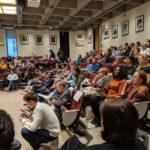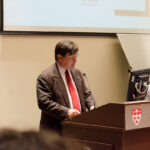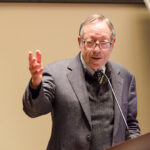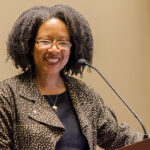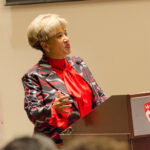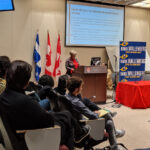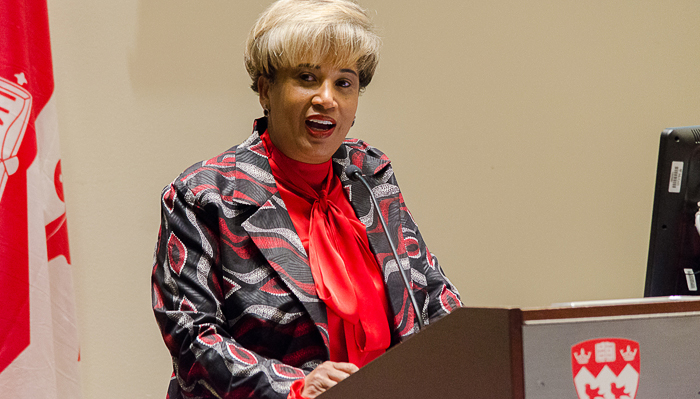
On October 30, the Faculty of Law had the great pleasure of welcoming the Hon. Justice Leona Theron of Constitutional Court of South Africa to give the 2019 Wallenberg Lecture. The event, hosted by the Centre for Human Rights and Legal Pluralism (CHRLP) in partnership with the Wallenberg Centre for Human Rights, took place in the Maxwell Cohen Moot Court before a crowd of faculty members, students, alumni, and friends of the Faculty.
Professor Francois Crépeau, OC, FRSC, Ad. E., the CHRLP’s Director, warmly welcomed the lecture’s attendees on his behalf and that of Professor Nandini Ramanujam, the CHRLP Executive Director, noting the Centre uses its human rights lecture series to bring distinguished and diverse voices to the faculty, the university, and the community at large. Then, Professor Emeritus the Hon. Irwin Cotler, PC, OC, OQ, BCL’64, LLD’19, Founding Director of the Wallenberg Centre for Human Rights and founder of the Wallenberg Lecture series, told the crowd of the Wallenberg Lecture’s roots. He detailed of the heroic acts of Raoul Wallenberg, the lecture’s namesake, a Swedish diplomat whose actions saved the lives of thousands of Jews in Hungary during the Second World War. Finally, Professor Adelle Blackett, Ad. E., BCL’94, LLB’94, introduced Justice Theron, highlighting her illustrious career and numerous accomplishments.
Justice Theron then took to the podium to present her lecture, “Are We All Equal?”, which explored the meaning and nature of equality in post-apartheid South Africa. The South African Constitution – which drew inspiration from the Canadian Charter of Rights and Freedoms – is significant: it requires the State to progressively realize the right to equality. Although a concerted effort has been made to establish a more egalitarian society post-apartheid, Justice Theron suggested that these efforts have not been enough. She noted the legacy of apartheid is still pervasive: “It has left the country with a legacy of disproportional disparity in wealth and access to opportunity.”
Justice Theron shared her personal experience with such inequality, noting that it had motivated and inspired her to fight for equal rights for all. For true equality to take form – that is, where South Africans are not simply equal bearers of rights, but where they equally enjoy these rights as well – Justice Theron stressed the need for transformative constitutionalism. This entails a long-term project of constitutional enactment, interpretation, and enforcement with the aim of transforming South Africa’s political and social institutions. Despite the challenges South Africa still faces in achieving substantive equality, Justice Theron ended her lecture on a note of hope: “Africa will raise leaders of integrity, where the right of equality will be realized. We will see the rainbow nation dreamed up by Mr. Mandela. Africa will rise.”
About Justice Theron
Justice Leona Theron completed a Bachelor of Arts and Bachelor of Law Degrees at Natal University, after which she was awarded a Fulbright Scholarship in 1989. She subsequently obtained a Master of Laws degree from Georgetown University, and worked for the International Labour Organization in Washington, DC.
She was first appointed to the bench in 1999, aged 33, becoming the first black woman judge on the KwaZulu-Natal High Court. In 2010, she was appointed as a Judge of the Supreme Court of Appeal. In 2016, she was appointed to the Constitutional Court by President Zuma. She was appointed to the Constitutional Court in July 2017 to replace recently retired Johann van der Westhuizen*. Over the years, Justice Theron has received numerous awards for her contribution to the development of justice in South Africa.
* Justice van der Westhuizen was an O’Brien Fellow in Residence at the CHRLP in March 2015.
- Held in the Moot Court in the early afternoon, the lecture was well attended.
- Francois Crépeau, the CHRLP’s Director, warmly welcomed the lecture’s attendees.
- The Hon. Irwin Cotler, founding director of the Wallenberg Centre for Human Rights and founder of the Wallenberg Lecture series, told the crowd of lecture’s roots.
- introduced Justice Theron, highlighting her illustrious career and numerous accomplishments.
- Justice Theron at the podium to present her lecture, “Are We All Equal?”
- In her lecture, Justice Theron shared her personal experience with inequality.
Words: Sarah Huzarski
Photos: Lysanne Larose

